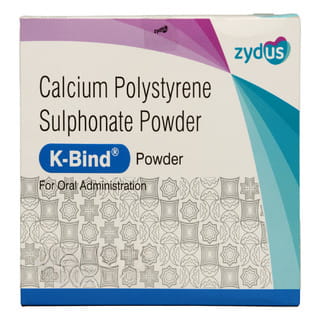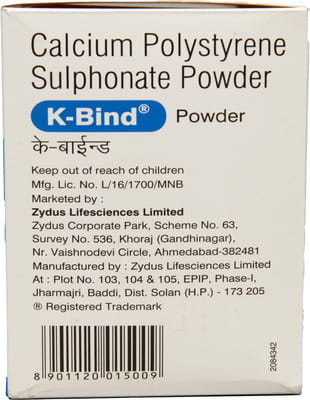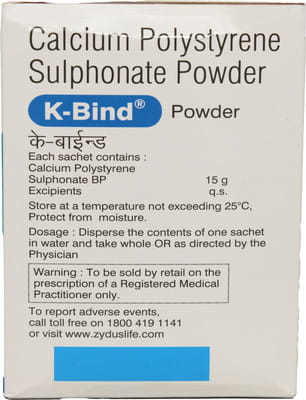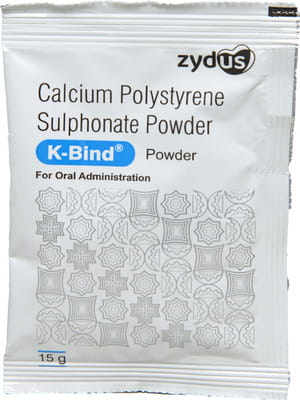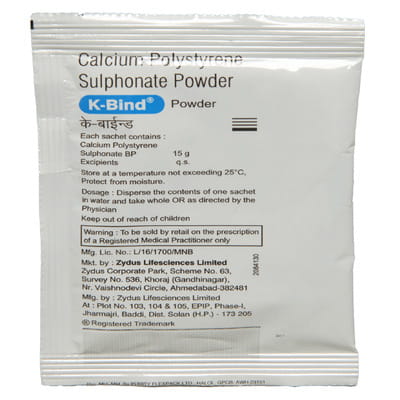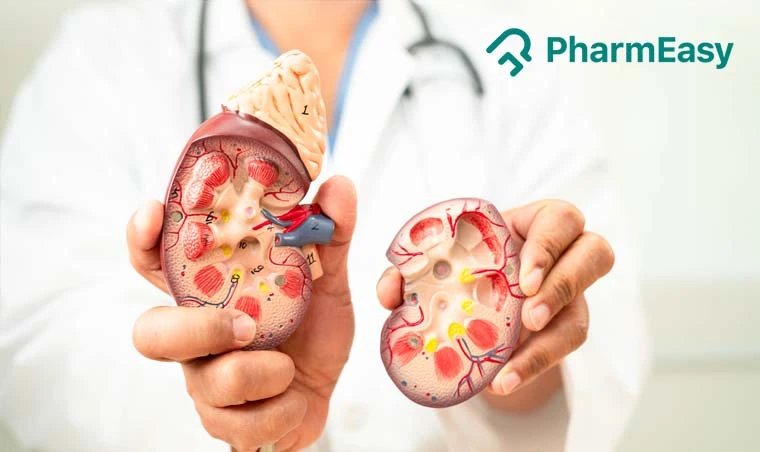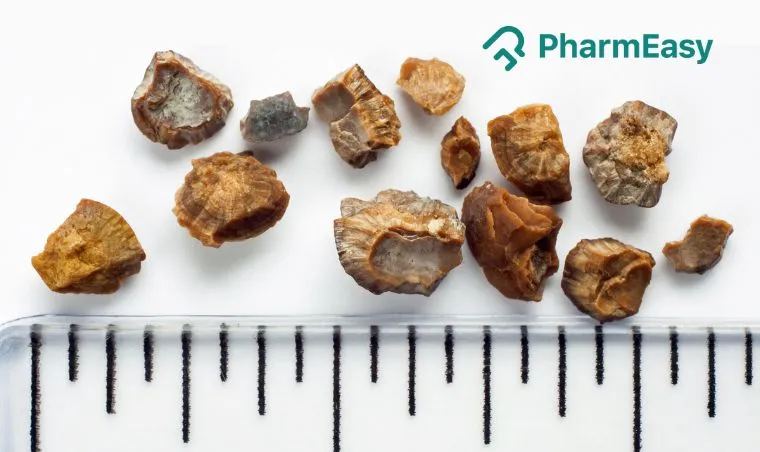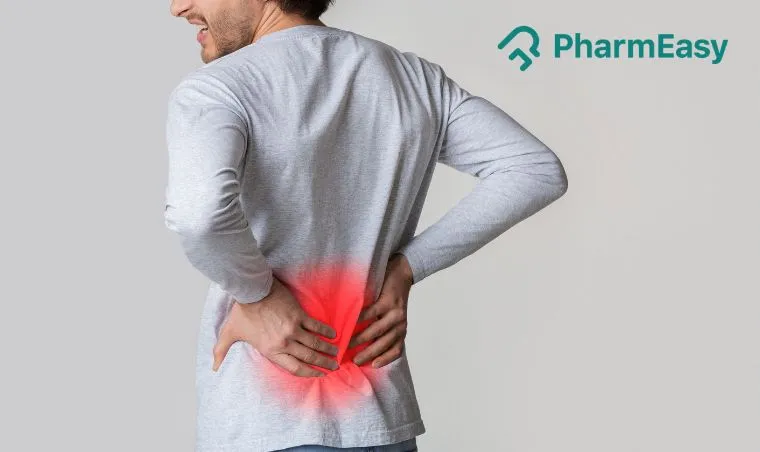K-Bind Oral Powder
Description
K-Bind powder reduces high potassium levels in your blood, a condition known as hyperkalemia. It contains polystyrene sulfonate as the active substance that works by removing the extra potassium in your body. K-Bind powder is for oral use only. It can be used in both adults and children. Take this medicine strictly as recommended by your doctor.
Other orally administered medications may bind to K-Bind powder, reducing their absorption and efficacy. Co-administration with other oral medications is not recommended. K-Bind powder should be taken at least 3 hours before or after other oral medications and 6 hours apart for patients with gastroparesis.
Avoid using sorbitol at the same time. Seek medical attention if you are experiencing severe abdominal pain, nausea, vomiting, stomach distension or rectal bleeding. Keep an eye out for other electrolyte imbalances caused by calcium and magnesium binding. If you experience clinically significant constipation, stop using K-Bind powder.
Laxatives containing magnesium should be avoided. Those on low-salt diets or at risk of sodium-related health problems should monitor their sodium intake. Patients suffering from congestive heart failure, hypertension, kidney damage or oedema should be closely monitored.
Product Summary
| Offer Price | ₹108.77 |
| You Save | ₹40.23 (27% on MRP) |
| Contains | Polystyrene Sulfonate(15.0 G) |
| Uses | High potassium levels |
| Side effects | Nausea, vomiting, constipation, low potassium levels |
| Therapy | DRUG FOR CHRONIC KIDNEY DISEASE |
Uses
Contraindications
- If you are allergic to polystyrene sulfonate or any other ingredient of K-Bind powder.
- If you have low levels of potassium in your blood.
- If your stomach/intestine is partially or completely blocked.
- In infants less than four weeks of age and/or with reduced movement of the stomach/intestine, K-Bind powder should not be given orally.
Side effects
- Nausea
- Vomiting
- Constipation
- Low potassium levels
Precautions and Warnings
Pregnancy
Breast Feeding
Driving
Alcohol
Other General Warnings
- You take any other oral medicines for other diseases.
- You have heart or kidney problems.
- You have high blood pressure.
- You have swelling in your arms or legs.
- Your child was prematurely born, had a low birth weight, or has decreased movement of the stomach/intestine.
- You develop symptoms like muscle pain/cramps, headaches, increased thirst, dizziness, restlessness, tiredness, confusion, sleeplessness after using this medicine.
- You experience constipation after taking this medicine.
Directions for Use
- Take this medicine as recommended by your doctor.
- Disperse the contents of the sachet in water and drink.
Storage and disposal
- Store in a cool and dry place away from direct sunlight.
- Keep out of reach of children and pets.
Quick Tips
- K-Bind powder contains Calcium Polystyrene Sulphonate, an Ion Exchange Resin used to treat hyperkalemia (high potassium levels in the blood) due to various medical conditions.
- Hyperkalemia can result from acute and chronic renal failure, burns, surgical shock, glomerulonephritis, and other kidney-related issues.
- K-Bind powder is also effective for hyperkalemia associated with anuria, severe oliguria, and in patients requiring dialysis.
- It works by releasing calcium ions in the stomach, which exchange with excess potassium ions in the large intestine, reducing potassium levels in the body.
- Take K-Bind powder as directed by a physician, typically in suspension form with water or a sweetened vehicle. Avoid using it with orange juice or other fruit juices.
- Common side effects include tiredness, confusion, muscle weakness, muscle cramps, altered heart rate, nausea, vomiting, and potential calcium and magnesium level imbalances.
- Use caution during pregnancy, breastfeeding, kidney problems, heart disease, allergies to the medication, breathing issues, and in children and adolescents below 18 years of age.
- Seek medical attention for severe side effects or overdosage, such as severe stomach or rectal pain, bloating, severe constipation, abnormal stools, coughing with blood, or signs of allergic reactions....
Dosage
Overdose
Missed a Dose
Mode of Action
How Does It Work?
Interactions
Interactions with other medicines
- Some medicines can affect the way K-Bind Powder works or K-Bind Powder itself can reduce the effectiveness of other medicines taken at the same time.
- Tell your doctor about all medicines, supplements, or herbals you are currently taking or might take to avoid any possible interaction.
- K-Bind powder should not be used if you are taking a sugar-free sweetener called sorbitol.
- Particular care should be taken if you are taking medicines for constipation that contain magnesium or aluminium (magnesium hydroxide, aluminium carbonate, aluminium hydroxide), heart failure (digoxin), thyroid disorders (thyroxine, levothyroxine), mental illness (lithium), medicines that contain salts such as magnesium or potassium....
Content Details
Dr. Arpit Verma
MBBS, MD, CCEBDM Diabetology
Dr. Ritu Budania
MBBS, MD (Pharmacology)
Frequently Asked Questions (FAQs)
Q: How does K-Bind powder reduce potassium?
Q: Can K-Bind powder be used in individuals with kidney disease?
Q: Does K-Bind powder cause diarrhoea?
References
- CDSCO [Internet]. Cdscoonline.gov.in. 2022 [cited 10 February 2022]
- Resonium A - Summary of Product Characteristics (SmPC) - (emc) [Internet]. Medicines.org.uk. 2022 [cited 10 February 2022]
- Resonium A - Patient Information Leaflet (PIL) - (emc) [Internet]. Medicines.org.uk. 2022 [cited 10 February 2022]
Did you find this medicine information helpful?
Please rate your experience
